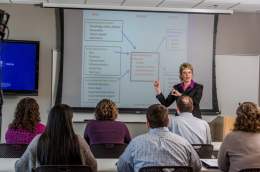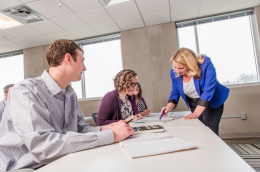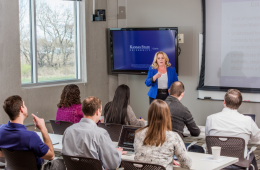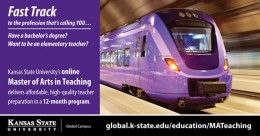Those who are working full time have options to grow professionally with graduate degrees and certificates at K-State Olathe and via distance education from the College of Education. The Professional Science Master in Applied and Technology degree and the Master of Arts and Teaching degree are the newest degrees available for those who are wanting to take the next step in their career.
K-State Olathe introduces STEM- and professional skills-focused graduate degree, certificates
Written by Greg Tammen, Communications Manager for K-State Olathe
According to recent economic reports, the greater Kansas City region is not producing enough professionals in the science, technology, engineering and mathematics — or STEM — fields to keep pace with employers’ demands. As a result, Kansas City is currently being outperformed by similar cities in the growth of young, STEM-educated talent while the need continues to increase.
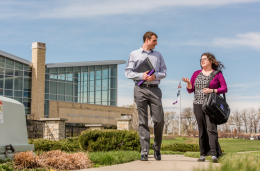 Kansas State University Olathe recently introduced the Professional Science Master in Applied Science and Technology degree, which seeks to address this need for STEM professionals. The degree is tailored for the greater Kansas City industry. It is designed for students to pursue advanced, multidisciplinary training in the sciences while simultaneously gaining hands-on experience and developing professional skills highly valued by employers and needed for career advancement. Courses are delivered in-person and online.
Kansas State University Olathe recently introduced the Professional Science Master in Applied Science and Technology degree, which seeks to address this need for STEM professionals. The degree is tailored for the greater Kansas City industry. It is designed for students to pursue advanced, multidisciplinary training in the sciences while simultaneously gaining hands-on experience and developing professional skills highly valued by employers and needed for career advancement. Courses are delivered in-person and online.
In addition to traditional education, students use the knowledge and skills learned throughout the program to complete a hands-on project that solves a real-world problem. During the capstone, students have supervision from a faculty mentor who is an expert in the student’s field. They also have the guidance of a supervisory committee and the option of being paired with a co-mentor from business, industry or government.
“Employers are demanding an agile and adaptable workforce that is not only highly educated in applied science, technology, engineering and math, but also has professional skills and practical experience,” said Janice Barrow, associate dean and associate professor in the School of Applied and Interdisciplinary Studies at K-State Olathe. “With the introduction of the Professional Science Master’s degree, K-State Olathe will be developing those skills, critical to the workforce. ”
The program received approved from the Kansas Board of Regents and the PSM National Office in April.
Currently, seven students are enrolled in K-State Olathe’s PSM program, which began Aug. 22. More students are anticipated to join in the spring semester.
K-State Olathe is working with STEM-based industry in Kansas City to introduce the degree. In July, it hosted a roundtable with leaders in the bioscience, animal health and food production sectors. On Sept. 13, the campus is hosting a larger rollout that brings together industry and community leaders, employers, employees, educators and students in greater Kansas City to discuss fulfilling the region’s demand for STEM professionals.
K-State Olathe also introduced two new graduate certificates. The Professional Interdisciplinary Science Graduate Certificate delivers scientific and technical skills for the health and food sectors. The Professional Skills for STEM Practitioners Graduate Certificate offers management, communication and critical thinking skills necessary for leadership roles in STEM industries and fields. A PSM degree can be earned by completing both certificates and the capstone experience.
For more information about degrees from K-State Olathe, visit k-state.olathe.edu/academics.
College of Education creates pathway to teaching for college graduates
Written by Patrice Scott
The College of Education at Kansas State University recently launched a unique pathway to the classroom for college graduates nationwide who want to become elementary school teachers.
The Master of Arts in Teaching, or M.A.T, is an intensive, one-year online degree specifically designed for people who have already earned a bachelor’s degree but want to pursue their dream of teaching. This degree program enables qualified Kansans and residents of other states to earn the degree in 12 months and be recommended for Kansas’ initial teacher licensure in grades K-6. The rigorous curriculum is delivered through online coursework, and field experiences are arranged in accredited elementary schools convenient to students in the program. Once out-of-state students pass the Kansas licensure exam, they can seek licensure in their home state.
Debbie Mercer, dean of the College of Education, believes this innovative program can help address the state’s and nation’s projected teacher needs while maintaining high professional standards.
“The college frequently receives inquiries from college graduates who want to become teachers but there has been no path available to them, other than the bachelor degree in education,” Mercer said. “Now, they have a road to that goal from a trusted, cost-effective program that has prepared teachers for more than 150 years.”
David Allen, associate professor and director of field experiences, explained distance supervision during the clinical semester will be achieved with the latest technology. A tablet or smartphone with a camera will be attached to a SWIVL, and teaching sessions will be video captured.
“The whole idea behind the M.A.T. is we will meet the needs of the graduate students no matter where they are,” Allen said. “M.A.T. students have responsibilities, families, jobs, that they can’t necessarily leave and move to Manhattan. I have a spreadsheet that indicates where each student wants to be placed for student teaching, and that’s a whole different ballgame than ‘we’re here in this brick and mortar building and there is only one way to become a teacher and that’s by coming to us.’ Their voice in this is critical because next year we’re branching out.”
The first cohort of M.A.T. students began in the May 2016 summer semester. Currently, 49 graduate students are enrolled in coursework and field experiences, on track to complete the degree in May 2017.
One of those students is Andrew Evans, Topeka, who brings a unique background to the M.A.T. cohort.
“In 1998 I went to law school in the hopes of making the world a better place and fight for justice, but now I realize I can do more in a public school classroom,” Evans said. “I feel that now more than ever Kansas needs good people who will fight for children, and that’s why I’m here.”
Tom Vontz, professor of curriculum and instruction and coordinator of the M.A.T. program, said the goal is to learn as much as possible and make improvements because the program will be expanded to students outside of Kansas next year.
“The college’s plan is to make the M.A.T. even better for Cohort 2 and expand its footprint across the region, primarily in Oklahoma, Colorado, Nebraska and the Dakotas,” Vontz said. “We know there are many career changers, especially ones who are geographically isolated from teacher education institutions, who might benefit from the program. We also know there is a strong demand for highly qualified elementary teachers across the region.”
To learn more about the Master of Arts in Teaching visit the College of Education website.
